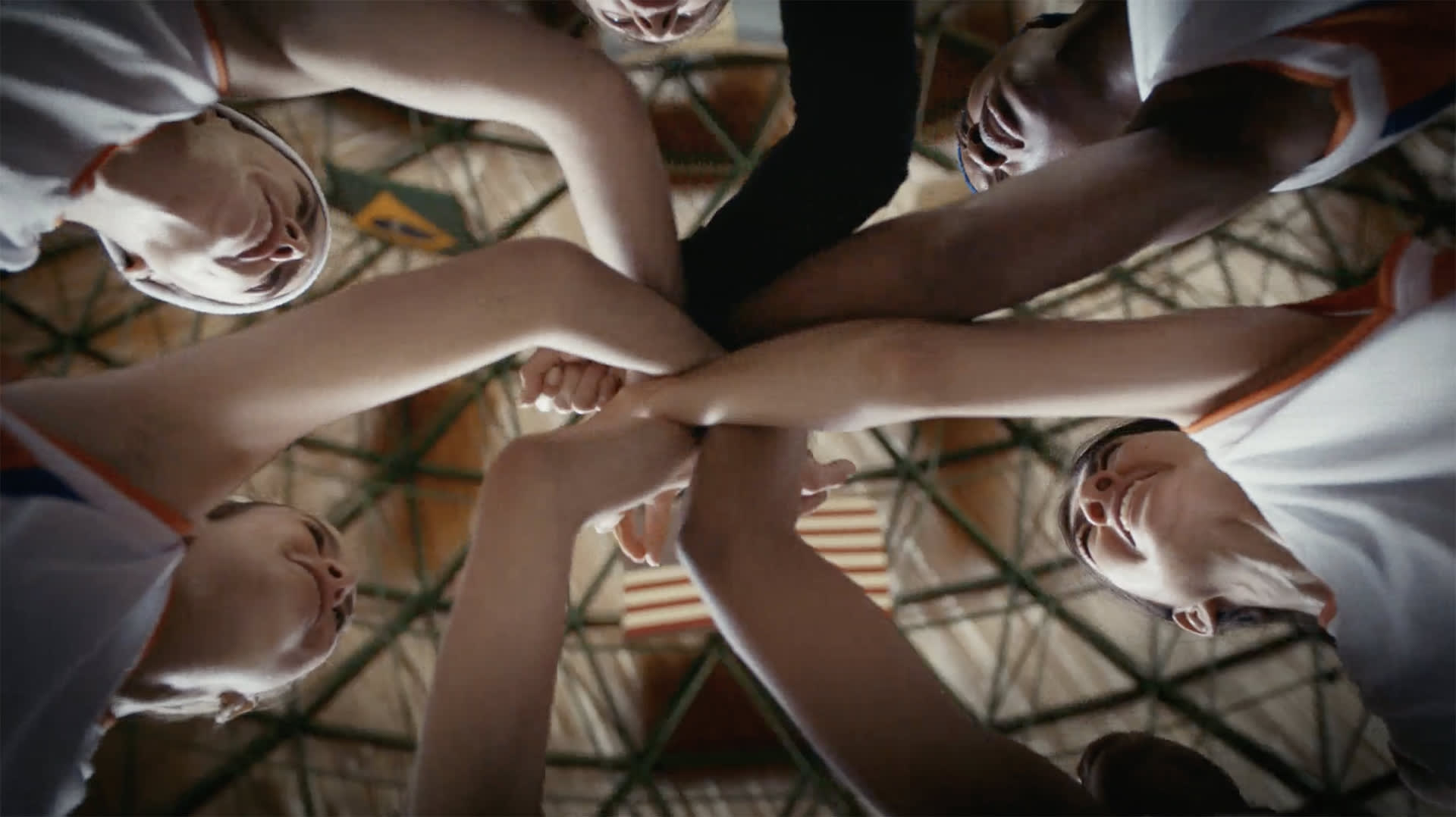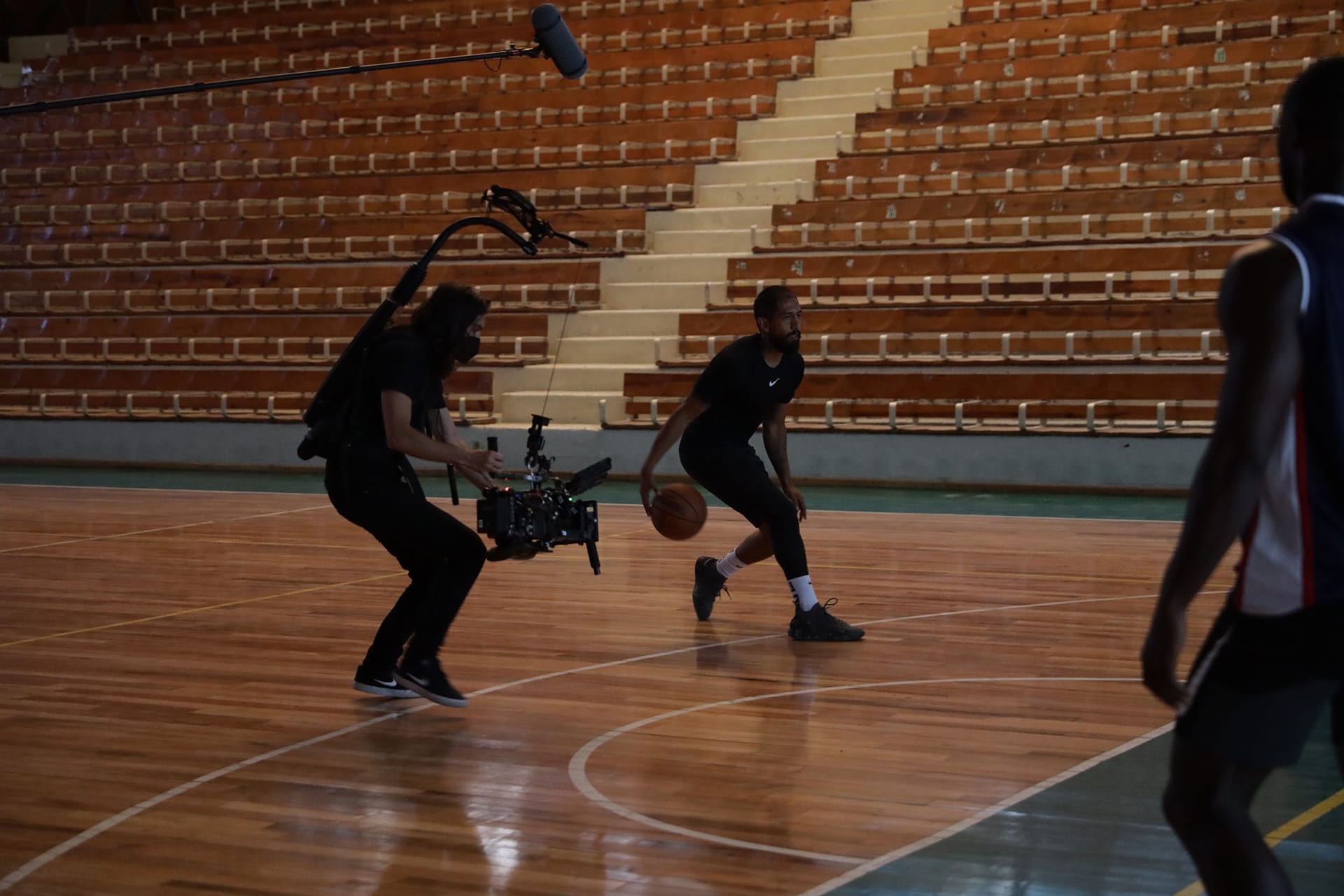There exists little intersection between Beyoncé’s afrofuturistic musical film Black Is King and the NBA outside of acclaimed director Emmanuel Adjei. The Ghanaian-Dutch filmmaker was one of 10 carefully-selected directors to help bring Beyoncé’s vision of representing the collective Black experience to the screen in 2020, and earlier this year he was able to do the same with the NBA’s global brand campaign “That’s Game.” In a series of four TV commercials during the NBA Playoffs, Adjei highlights pickup basketball games and youth basketball teams that unify people while contrasting it with the moments in NBA Playoff history that have bonded millions around the sport of basketball.
“We tried to focus on the collectiveness of it. Obviously, it helped a lot coming from Black Is King. The structure of that project helped me, as a director to get the NBA spots in a similar kind of way,”Adjei told Complex.
The spots are narrated by the sage voice of Golden Globe and SAG-winner Idris Elba. Athletes throwing balls in baskets may not seem more profound besides a few hours of entertainment, but Elba waxes poetic about the game being “poetry in motion, science fighting art” and makes it nearly impossible to not see how NBA has had a fundamental effect on the human experience as a whole. “Working with the NBA on ‘That’s Game’ has given me the opportunity to blend my passions of sport, music, and art,” said Elba. “I’m excited for the campaign to come to life and for fans globally to experience this cultural intersection.”
Speaking with Complex, Adjei explains he and the NBA married their styles for the TV spots, working with Beyoncé on Black Is King, and plans he and the other directors had to expand the story of Black Is King more before the pandemic.
How did you connect to the NBA, and what drew you to this?
For me, it was more the fact there was a line in the brief I read that struck me, which was “poetry in motion.” For me, that sums up exactly what basketball is. It was a love letter to basketball. That being said, as a filmmaker, that opens up a whole new set of understanding of how I could make a film that touches people.
To that point, you showed the universality of the human experience of playing basketball. There are different races, genders, and nationalities all embracing the sport in different ways. What from your style of filmmaking did you marry with what the NBA wanted?
Because basketball is such a universal sport, it was really trying to grasp the true essence of humanity in its most meaningful way, the emotional aspect of the game, the fast pace as well. That covers a whole range of emotions. You can almost say it’s a “compressed version of a lifetime.” You have the up’s and down’s, and it’s quite unique as a sport. That’s what I really tried to capture in a relatively short amount of time. I tried to look through that lens with all of these moments and create a tapestry of moments.

These spots are coming out during a pandemic that made the world go back to the basics and take inventory of their lives to see what’s important. The NBA was big on supporting social justice messaging in its playoffs last year. How did the specter of the pandemic influence how you put this together?
From a very practical point of view, we were sort of forced to rely on the stuff that was already there, such as the things that were already shot. As you said beautifully, we were sort of going back to the basics. We were going to back to what was most important to us. The pandemic sort of gave me the opportunity to take a step back and really try to take the time to think about what’s meaningful. It’s a fast-paced sport, and this time it wasn’t about it being fast-paced. The focus was more about being on pause and that’s what the pandemic did. It sort of brought this very beautiful moment where the pandemic sort of reinforced the beauty of the game.
As you alluded to, these spots speak to the collective experience of basketball that we all share. Another project you worked on that focused on the collective experience was Beyoncé’s Black Is King. How did you get involved with that?
For Black Is King was, similarly with the NBA, there was a captain on the ship, which was Beyoncé. (Laughs) In this case it was the NBA. She had a very clear vision of what she wanted and basically brought in creatives, me being one of them. It was almost like trying to create a new library of symbolism, textures, colors, and all of these things and bring them all together in a narrative. Going back to the tapestry, the “That’s Game” spot, does that similarly. We tried to focus on the collectiveness of it. Obviously, it helped a lot coming from Black Is King. The structure of that project helped me as a director to get the NBA spot in a similar kind of way.
With Beyoncé being the captain of the ship, I know how hands-on she is with her work. Is there a scene you worked on that you remember her particularly having a direct input on?
To be honest, she was hands-on on everything. (Laughs) But, it wasn’t like being a control freak. It was more like she really respected what I brought in. For a lot of the scenes, we shot multiple versions so we had options to pick. We really created moments. In post-production, to have meetings with her and to really discuss the strength of each shot, because every shot was considered. It was very special to be part of something collectively and still be able to be an individual. I guess basketball is sort of the same in the way it’s celebrating individuality and also the team.

I read one of the directors say y’all were going to expand the story before the pandemic hit.
Yes. Yes.
What expansion to the story were you planning on doing?
Because of the eclectiveness of the project, it literally had no boundaries. At some point, you realize you don’t want to make your audience art blind. That sort of helped us narrow it down to something everyone could digest. One of the things that was very defining to that project was the unfortunate deaths of George Floyd and Breonna Taylor. The project had to come out because we needed something uplifting that celebrated Black culture. It was the momentum that pushed us to put it out. From an art perspective, we could’ve gone on forever.
Black Is King needed to come out during the social unrest. Why does this NBA spot need to come out now?
To me, it represents the promotion and the developments of leaders who can be advocates for change. This is the right time to celebrate them. We’re ready for it. For me, it felt like the NBA did a great job of bringing a strong creative team aboard to really relay that message. It’s easy to just do a spot, but using your power and platform to be a leader in that sense, was really smart and meaningful.


